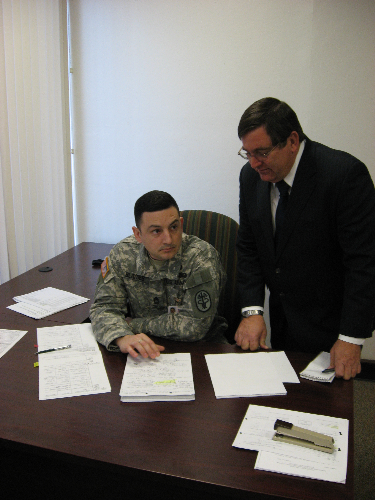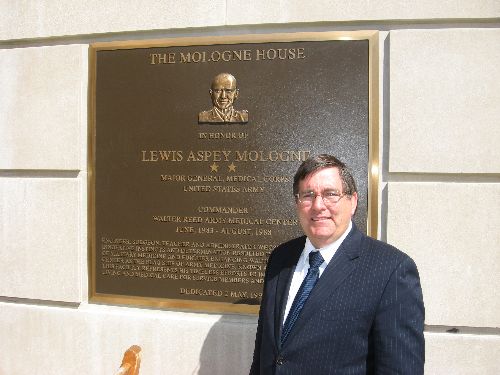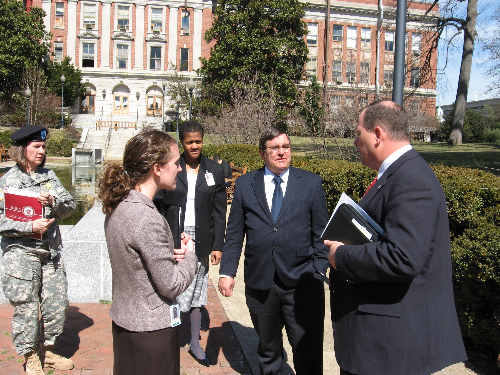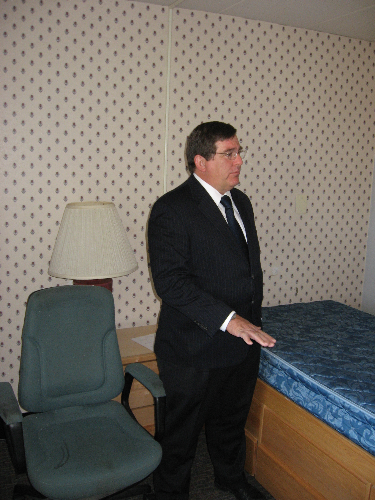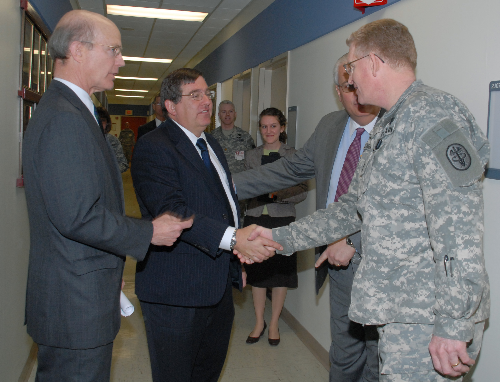A Visit to Walter Reed
WASHINGTON, DC,
March 12, 2007
|
Michelle Stein
((202) 225-7772)
Tags:
Veterans Affairs
 Video Mr. CARTER. I am going to yield to the good doctor, to my colleague from Texas (Mr. Burgess), and one of those fine medical professionals that we have been talking about that serve here in the United States Congress. Mr. BURGESS. Mr. Speaker, I thank the gentleman for yielding. I thank him for convening this hour this evening. I think it was extremely important, extremely timely that we have this discussion on the House floor, and I am especially glad that we have been joined by such prestigious members on the House Armed Services Committee because I think their words certainly add much more than what I would be able to bring to the subject. I will just have to say I went to Walter Reed this afternoon, asked to go last week, because I thought it was important as one of the medical professionals in Congress that I go out and just look and see is there anything that causes me grief, that causes me concern. I will have to say I was not upset about the things that I expected to be upset about, and I was upset about things that never would have occurred to me to be upset about, and let me elucidate that a little bit if I can. Of course I read the stories in the newspapers last week, and I expected to be upset about the physical condition of the building, and the building in question, Building 18, which is just across the street from the Commanding General's residence at the Walter Reed Medical Garrison there in Northeast Washington. Indeed, the building is not the nicest of buildings in Washington, D.C., and I am sure there has been some attention to some of the problems that had already been rendered to the building in the week between the time the story broke and the time that I got out there, but in general, if you stop and think about what this housing was designed to do, it was obviously to provide a place for soldiers to stay while their medical conditions were evaluated, but while they decided do they stay in the military, do they get out, if they are able to undergo the physical processes for rehabilitation or allowed to stay in the military, how much time is going to be required. This location, Building 18, being outside the medical garrison of Walter Reed Hospital, had some appeal because it was outside the garrison, and as a consequence there was perhaps a little more freedom, a little more freedom of movement. There is a parking garage underneath it, not quite the same level of restriction that you have within the medical garrison itself.
So the actual physical condition of the building, again, I am sure it had received some attention between the time the story broke and I got out there, was less distressing to me than some of the things that I heard that our wounded soldiers have to go through. I snapped a picture while I was out there. The gentleman talked about the massive amounts of regulation and red tape. Here is a gentleman going through his medical records. I do not think this picture does it justice, but this is about the size of the Dallas phonebook that he has got in front of him. These are his medical records he has got spread out on the table, and he is trying to put them in some semblance of order so he can make his case for the time he gets out of the military to assess his degree of disability if he were to wish to stay in, to be able to make the argument that he would be able to stay in the military. But an individual such as this, and this individual, in fact, was part of the Medical corps, you can see on his shoulder patch there. So he had some knowledge of the types of record he was reviewing on his own behalf. Just imagine someone without any medical expertise having to go through these numbers of records, and then what if it all gets lost, which unfortunately happens. Twenty-four hours total time that he spent in assembling these records, and unfortunately, he told me, it is not an infrequent occurrence, it is not just that a soldier's appointment would be canceled, that they expected for a few weeks time. It is not just that the ride to the hospital did not materialize, but this amount of work going into essentially what will define his future could be misplaced, and in this day and age, when we talk about the computerization of medical records, we talk about the VA system being on an electronic medical records system, there is no way right now for these medical records generated by the Department of Defense to talk to the medical records in the VA system. So it is a lot of work that we ask these folks to go through on their own behalf, and unfortunately, it can occur that after putting all those hours in this record ends up on the wrong place on someone's desk, and when the time comes to retrieve it, it cannot be found. That was a one of the things, again, I never expected to see today when I went to the hospital but certainly caught my attention when I visited. I would stress, and just like the chairman, just like my friend from Texas, I too have been to Landstuhl Hospital in Germany, spent a good deal of time on two separate occasions at the field hospital in Balad, Iraq, and spent some time at the Ebosina Hospital in downtown Baghdad last summer. In fact, that is the hospital where the famed Baghdad ER show was taped, and I would have to say through all of that exposure to the medical care available to our soldiers in the field, the so-called down range exposure, their medical care is top notch. I had an emergency room physician, an orthopedist in Balad, Iraq, tell me he had medicines and treatments at his disposal out in the field that he would never have had available to him in downtown Cincinnati. It is that training, that expertise that he gains dealing with those new treatments and those new therapies that will then make him a better physician, and he acknowledged this. I will be a better doctor when I go back to take care of the civilians in Cincinnati, Ohio, than I was before I left because of my experience here in Balad. I have heard other people refer to it, but certainly we have many, many dedicated men and women in the medical staff, the nursing staff at Walter Reed Hospital and our other fine military hospitals, and it does pain me somewhat to think that these individuals are also reading these stories. They go to work every day to do their best work. They go to work every day to take care of the genuine American hero, and then they hear their efforts and their professions demeaned in the press. I know how disheartening that can be and I would say to those individuals working in the Medical corps in our military hospitals and the Nursing corps in our military hospitals, God bless you. Thank you for what you do because individuals like this who, in another time and another place, might not have had such a happy outcome, he, in fact, is looking forward to a return to civilian life and being quite productive thanks to the expert care that he received at Walter Reed Hospital. One thing that I do want to bring up because it is terribly important, the Wounded Warrior Transition Brigade, which was just announced last week and has been formed this week. Major General Eric Schoomaker, who is the new command at Walter Reed Hospital, this establishes essentially a patient advocate in uniform, patient advocacy within a military context.
This is one of the things, when we hear about the failures of leadership that resulted in some of the problems that have surfaced at Walter Reed Hospital, this was the type of leadership that was lacking. So these small brigades, which will now be composed of one leader with 17 men or women under his command in those units who are awaiting a medical decision on their military future, certainly tightening up that ratio between leader and the number of men and women in the cohort will significantly improve things, I think, as far as the advocacy for our heroes. So the gentleman from Texas was very kind to call me down and let me participate in this. I thank you very much for your leadership on this. It is extremely timely and extremely important. Mr. CARTER. I thank my colleague from Texas for his comments and his expertise as a doctor. He is invaluable to this House, and we are very, very proud to have him as a Member of this House. I am proud to have him as a friend. |
Latest from twitter
Get the most up to date news from me on Twitter.

